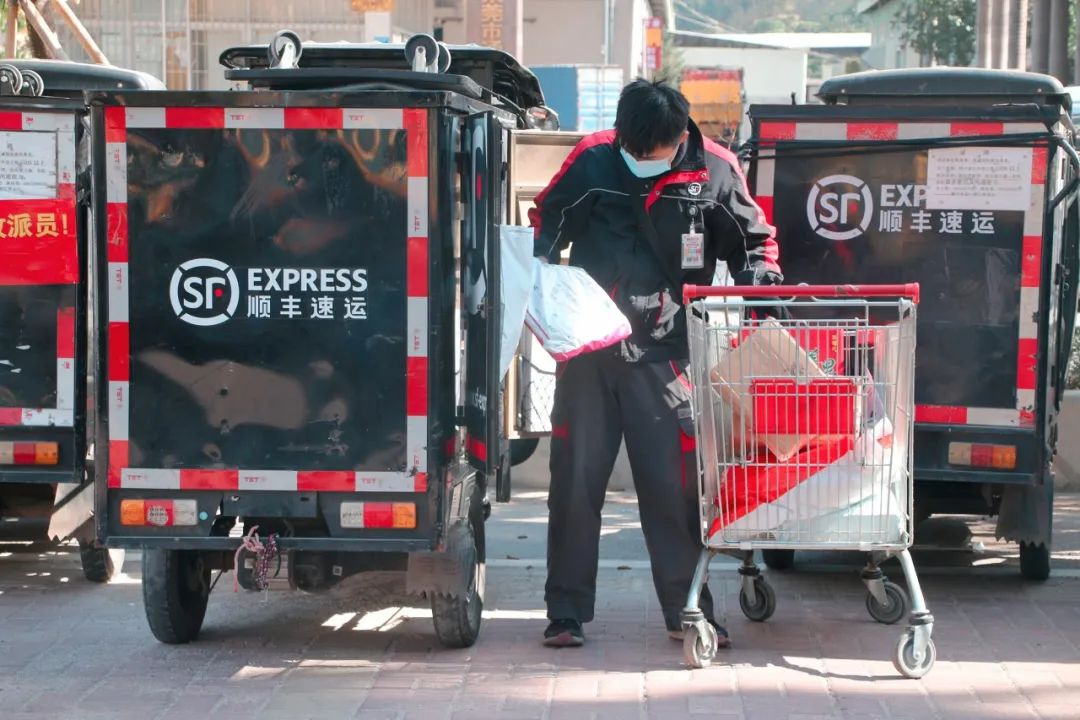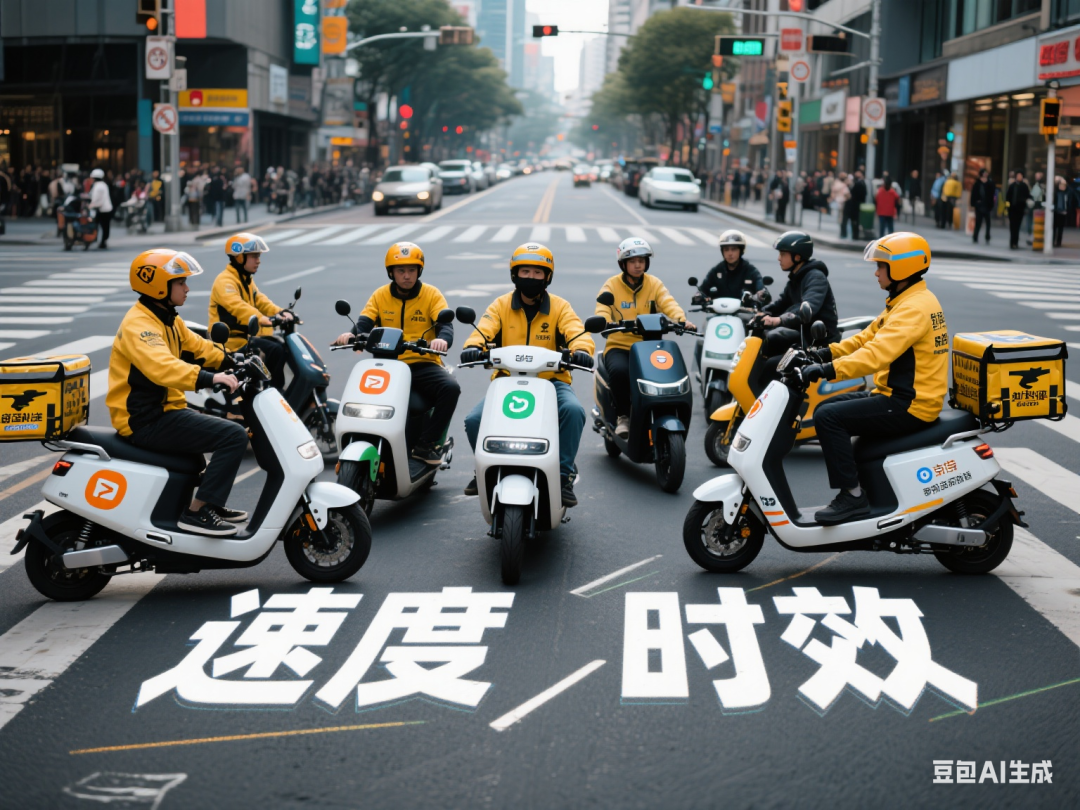Instant Retail War: The Express Delivery Industry in Turmoil
![]() 08/14 2025
08/14 2025
![]() 571
571

For years, the express delivery industry has been sounding the alarm, and in 2025, the warning signs are resurfacing with urgency.
The express delivery market now confronts a triple crisis: growth primarily stems from order splitting, with limited value increase; pressure on Pinduoduo hints at low-cost e-commerce losing its high-growth potential; and the impending explosion of instant retail in 2025, which may reshape user consumption habits, encroaching on the growth space of both e-commerce and express delivery.
So, who will be most impacted in the express delivery market? How can players secure a stronger foothold in this inevitable battle for scarce resources?
Crisis
The looming crisis of dwindling resources in the express delivery industry appears to be resurfacing.
In Q1 2025, China's express delivery business volume grew by 21.6% year-on-year, and by the first half of the year, this rate dropped to 19.3%. Compared to 21.5% in 2024, the decline in growth rate is noticeable.
In fact, this growth crisis is not new to the express delivery market, but this time, the wolf has truly arrived, posing a higher danger coefficient.

Around 1993, Wang Wei founded SF Express in Guangdong, while Nie Tengfei established STO Express in Zhejiang, marking the inception of China's express delivery industry with its dual northern and southern origins.
Initially, express delivery catered primarily to documents. Wang Wei's story of hauling a suitcase back and forth between Hong Kong to deliver documents has always been a fascinating tale.
In 2003, with the advent of Taobao, followed by JD.com and Tmall, e-commerce soared, and express delivery, as its vital infrastructure, gradually entered a golden era.
In 2000, China's express delivery business volume surpassed 100 million pieces for the first time; around 2007, it entered a rapid growth phase, exceeding 1 billion pieces; in 2014, it breached 10 billion pieces; in 2021, it hit 100 billion pieces; and in 2024, it reached 175 billion pieces. From 2006 to 2021, the average annual compound growth rate hovered near 50%.
Around 2022, traditional e-commerce underwent a transformation, and e-commerce express delivery entered a phase of sluggish growth. Coupled with special circumstances, the growth rate of express delivery business volume plummeted to 2.1% that year.
However, the meteoric rise of live streaming e-commerce on platforms like Douyin and Kuaishou, along with low-cost e-commerce pioneers like Pinduoduo, spurred the rate of order splitting in the express delivery market. In recent years, China's express delivery business volume has regained its high-growth trajectory, with growth rates of 19.4% and 21.5% in 2023 and 2024, respectively.
Despite the decline in average order value and years of price wars, leading to a year-on-year drop in express delivery unit prices, the industry has achieved low-value growth, with many express delivery companies witnessing a significant decline in profitability.
This mediocre status quo didn't last long. The real crisis for the express delivery industry emerged in 2025 – instant retail.
Impact
After years of gestation, instant retail erupted in 2025.
In previous years, even with front-end warehouses like Dingdong Maicai and Pupu Supermarket, as well as Xiaoxiang Supermarket and Hema Supermarket, the initial business volume of instant retail remained insignificant annually.
In February of this year, JD.com announced its foray into the takeout market with a hefty subsidy of 10 billion yuan; in mid-April, Meituan officially launched its independent instant retail brand "Meituan Flash"; by the end of April, Taobao unveiled "Taobao Flash," merged with Ele.me in late June, and subsequently announced a 50 billion yuan subsidy plan.
Amid relentless advertising and subsidies, the top platforms' business volumes have surged. The latest disclosed data suggests that the combined daily order volume of these three major platforms may reach 200 million.
It is estimated that throughout this year, the cumulative instant retail business volume of these major platforms will reach tens of billions of orders, with GMV hitting the trillion-yuan mark.
A substantial portion of this growth stems from the transformation of e-commerce business. Over the course of this year, the market holds an optimistic view on how much of the traditional e-commerce market these top platforms, such as Taobao Flash, Meituan Flash, and JD Second Delivery, can capture.
If, after years of influence, users adopt instant retail as a consumption habit, making it a way of life, will it cannibalize the growth space of the express delivery market or even seize its fundamental business base? This is the concern of the entire market towards traditional express delivery services.

If the rise of instant retail impacts the entire express delivery industry due to the rise and fall of one another, among the top express logistics companies, those most affected may not be the Tongda franchise express delivery firms, primarily focused on e-commerce, but rather high-end e-commerce logistics supply chain systems like JD Logistics.
Categories like fruits, fresh produce, beverages, and alcoholic beverages, which haven't achieved high penetration in the traditional e-commerce market, are ideally suited for instant retail.
A significant portion of these, particularly higher-value branded products, are key categories for JD Logistics' Asia One warehouse.
Through high-end e-commerce logistics supply chain systems like JD Logistics' Asia One warehouse, JD.com strives to achieve half-day delivery for e-commerce logistics in major cities, nearly the efficiency limit of traditional e-commerce logistics distribution.
However, in the face of instant retail, this comparative advantage can easily be neutralized.
Therefore, as Meituan gradually maps out a blueprint of "retail + technology," JD.com has to adopt an offensive stance, attacking Meituan's core business with JD takeout to avoid being undermined in the express logistics market. This is the hidden agenda behind the outbreak of the takeout war earlier this year.
Replacement
Amidst the intense instant retail war, one company's stock price surge has exceeded most expectations.
Starting in early May, SF Express City Express's share price skyrocketed from less than HK$8 to nearly HK$20 per share by the end of June, now stabilizing above HK$16, pushing its P/E ratio to over 100 times.
Perhaps the massive investment in the instant retail war will impact the short-term profits of top platforms; in the long run, the war's direction remains unclear.

However, the market consensus is that in the instant retail market, those generating revenue now must be service providers for instant retail business.
Although there are differences in network granularity between express delivery, city express delivery, and instant delivery, resulting in limited compatibility between city express delivery and instant delivery at present, the potential for deep cooperation between Taobao Flash, Meituan Flash, JD Second Delivery, and companies like SF Express City Express and Flash Express remains high. Dada's privatization and full integration into the JD system are also based on such considerations.
In the long run, with the evolution of instant retail, cross-regional delivery of high-value goods can enable city express delivery to complement instant delivery.
For instance, high-value goods like Apple phones, Moutai liquor, and luxury items will offer certain development opportunities for differentiated high-end instant delivery services like SF Express City Express.
More importantly, in the long term, once users adopt instant retail as a consumption habit, the instant delivery service within the same scenario will drive up the usage frequency of city express delivery to a certain extent. This bodes well for city express delivery platforms like SF Express City Express, Flash Express, and Dada.
However, no matter how instant retail evolves, it will eventually reach a stalemate with e-commerce. The industry forecasts that the instant retail market size will reach 2 trillion yuan by 2030, with a long-term outlook of 3-4 trillion yuan.
No matter how vast the demand for instant delivery grows, it won't impact the express delivery market's massive scale in the short term.
However, in the upcoming era of scarce resources, the express delivery industry has entered the second half of the competition for efficiency and service, and the industry's operating mode urgently needs an upgrade.
The competition among express delivery companies will no longer be solely based on primary resources like transfer centers, routes, and outlets but will also test higher-order resources like air transport capacity, supply chains, and automation built upon these foundations.
Leading companies that have made early layouts, such as SF Holding, JD Logistics, and ZTO Express, still warrant optimism.
In the current express delivery landscape, companies that merely focus on package delivery are at risk. Such companies may even face their own critical juncture before instant retail achieves widespread adoption.







